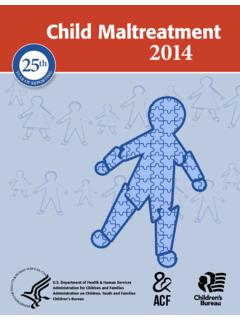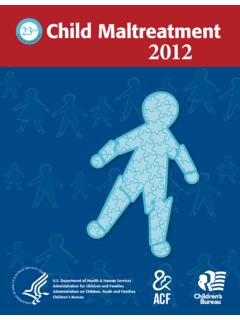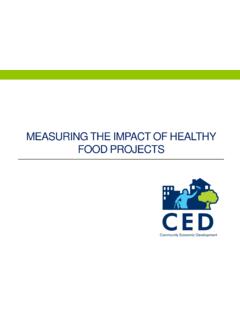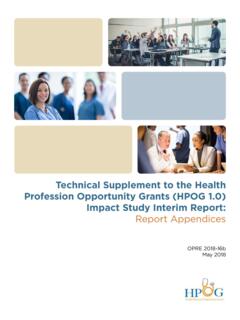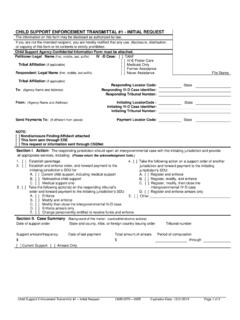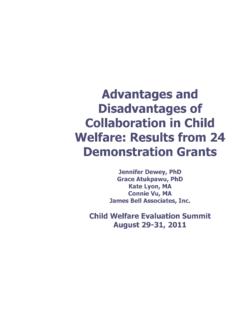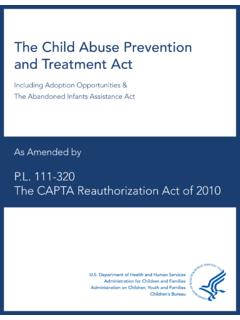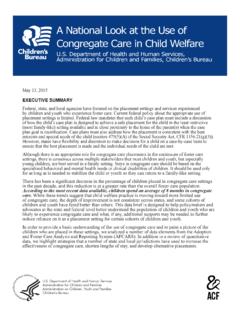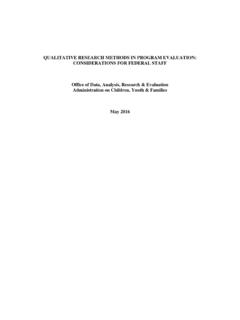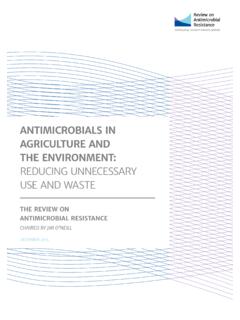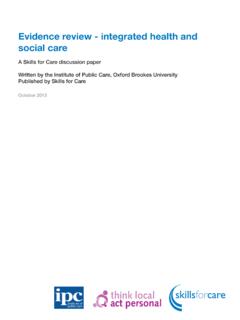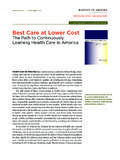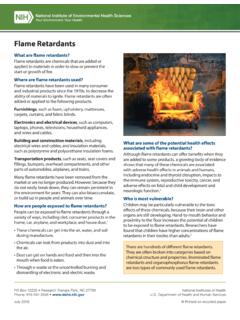Transcription of DEPARTMENT OF HEALTH AND HUMAN SERVICES
1 DEPARTMENT . OF HEALTH . AND HUMAN . SERVICES . FISCAL YEAR. 2020. ADMINISTRATION FOR. CHILDREN AND FAMILIES. JUSTIFICATION OF ESTIMATES FOR. APPROPRIATIONS COMMITTEES. MESSAGE FROM THE ASSISTANT SECRETARY. I am pleased to present the FY 2020 President's Budget request for the Administration for Children and Families (ACF). ACF programs strive to promote the economic and social well-being of children, individuals, families, and communities so that all may participate fully in the benefits of American society. The FY 2020 ACF Budget includes legislative proposals to facilitate that participation by promoting work, building strong families, promoting strong social networks, and achieving efficiencies and reducing waste. The ACF Budget maintains and builds up reforms proposed in the FY 2019 President's Budget. This budget includes a new $1 billion competitive Child Care fund aimed at building the supply of care for underserved populations and to stimulate employer investment.
2 For Foster Care, this request includes a new proposal providing more flexibility for prevention SERVICES and a demonstration incentive project aimed at improving child permanency and well-being outcomes. The Budget also provides supports to allow parents and caregivers to build or maintain their self-sufficiency while ensuring their children receive high-quality care and early education. This Budget demonstrates a commitment to early childhood outcomes by continuing to fund Head Start and Child Care at historically high levels. In addition, this Budget preserves funding for SERVICES to at-risk children and families in need, including victims of child abuse and neglect and victims of family violence. This Budget improves enforcement tools to engage more parents in payment of child support. This Budget includes several proposals that support the Administration's goal of reducing duplication and increasing the effectiveness and efficiency of federal benefit spending programs.
3 This Budget proposes to eliminate funding for programs that have not demonstrated strong performance outcomes including the Low Income Home Energy Assistance Program, the Social SERVICES Block Grant, the Community SERVICES Block Grant, the Community Economic Development program, and the Rural Communities Facilities program. /s/. Lynn A. Johnson Assistant Secretary for Children and Families This page intentionally left blank. JUSTIFICATION OF ESTIMATES FOR APPROPRIATIONS COMMITTEES. ADMINISTRATION FOR CHILDREN AND FAMILIES. TABLE OF CONTENTS. MESSAGE FROM THE ACTING ASSISTANT SECRETARY. TABLE OF CONTENTS. ACF ORGANIZATION CHART. Overview of the FY 2020 Congressional Budget Justification .. 1. All Purpose Table .. 6. Low Income Home Energy Assistance Program .. 11. Refugee and Entrant 27. Child Care and Development 71. Children and Families SERVICES Programs .. 97. Payments to States for Child Support Enforcement and Family Support Programs .. 213.
4 Social SERVICES Block Grant .. 241. Promoting Safe and Stable Families .. 257. Payments for Foster Care and Permanency .. 287. Children's Research and Technical Assistance .. 321. Temporary Assistance for Needy Families .. 335. Non-Recurring Expenditure 361. Supplemental Material .. 363. Administration for Children & Families Deputy Assistant Secretary for Assistant Secretary Policy Lynn A. Johnson Heidi Stirrup Office of Early Childhood Principle Deputy Assistant Secretary Development Steven Wagner Vacant Deputy Assistant Secretary for External Affairs Chief of Staff Vacant Anna Pilato Office of HUMAN Office of Regional SERVICES Emergency Office of Child Support Office of Refugee Office of Head Start Office of Child Care Operations Preparedness & Enforcement Resettlement Response Deborah Bergeron Shannon Christian Mishaela Duran Scott Lekan Jonathan Hayes Natalie Grant Region I- Boston, MA, Elaine Zimmerman Administration on Office of Community Office of Family Region II- New York, NY, Joyce Thomas Children, Youth & SERVICES Office of Administration Assistance Families Clarence H.
5 Carter Ben Goldhaber Region III- Philadelphia, PA, Martha Okafor Clarence H. Carter Jerry Milner (Acting) (Acting). Region IV- Atlanta, GA, Carlis Williams Region V- Chicago, IL, Angela Green Region VI- Dallas, TX, LaKesha Pope Region VII- Kansas City, MO, Vacant Region VIII- Denver, CO, Nikki Hatch Office of Planning, Office of Legislative Administration for Native Office of Research & Evaluation Affairs & Budget Americans Communications Region IX- San Francisco, CA, Vacant Naomi Goldstein Amanda Barlow Jeannie Hovland Brian Marriott Region X- Seattle, WA, Vacant OVERVIEW OF THE FY 2020 CONGRESSIONAL BUDGET JUSTIFICATION. INTRODUCTION AND MISSION. The mission of the Administration for Children and Families (ACF) within the DEPARTMENT of HEALTH and HUMAN SERVICES (HHS) is to foster HEALTH and well-being by providing federal leadership, partnership, and resources for the compassionate and effective delivery of HUMAN SERVICES . ACF. administers programs carried out by state, territorial, county, city, and tribal governments as well as by private, non-profit, and community- and faith-based organizations designed to meet the needs of a diverse cross-section of society.
6 OVERVIEW OF THE REQUEST. The FY 2020 President's Budget request for ACF, including both mandatory and discretionary appropriations, is $ billion in budget authority, a decrease of $ billion from the FY 2019 enacted level. ACF's budget focuses on facilitating participation in American society through promoting work, shifting resources to prevention in child welfare, and maintaining support for early childhood education and care. Funds are also included for programs that serve victims of domestic violence, victims of HUMAN trafficking, unaccompanied alien children, and runaway and homeless youth. Proposals in this request further demonstrate a commitment to reining in entitlement spending and supporting the Administration's goal of reducing the federal deficit. Specifically, the Budget: Promotes self-sufficiency through proposals to improve public safety net programs, including Temporary Assistance for Needy Families (TANF). These proposals include a demonstration project to redesign welfare programs and reforms to focus on employment and program integrity within TANF, while also reducing the TANF program block grant by 10 percent and eliminating the TANF.
7 Contingency Fund. Maintains funding for child care and creates a new, one-time competitive $1 billion fund aimed at building the supply of care for underserved populations and to stimulate employer investment in child care. The request includes $ billion for the discretionary Child Care and Development Block Grant, the same as the FY 2019 enacted level. This request also includes additional mandatory funding for the Child Care Entitlement to States (CCE) to ensure that federal child care funding is maintained over ten years. To achieve this proposal, the Budget requests an increase of $ billion in budget authority over ten years ($ billion in outlays) for the CCE and uses these investments to leverage additional state funding for child care. Expands flexibility within child welfare resources to strengthen families, focus on addressing the opioid epidemic, and prevent unnecessary trauma and harm to children and families in need of child welfare SERVICES .
8 In the Foster Care program, the Budget will create a budget-neutral flexible funding option to support prevention. To strengthen programs, the Budget creates a demonstration project to reward participating states and tribes that achieve key child welfare outcomes. Adjusts funding for Refugee and Entrant Assistance programs to reflect the expectation that fewer refugees and other entrants will enter the in FY 2020 (a decrease of $91 million from the FY 2019 discretionary enacted level). This request would support a total of approximately 93,000 arrivals in FY 2020, including 30,000 refugees as well as SIVs, asylees, Cuban and Haitian entrants, and victims of trafficking, and continues the policy of providing eight months of cash and medical assistance to qualifying individuals. Maintains funding for Unaccompanied Alien Children and creates a mandatory contingency fund to address continued uncertainty with program trends. Administration for Children and Families FY 2020 Justification of Estimates for Appropriations Committees Page 1.
9 Maintains funding for Head Start and proposes changes that will reduce the burden of operating these programs by simplifying reporting requirements that will lessen administrative burdens on grantees so they can focus on providing SERVICES . It is estimated that this level of funding will serve about 871,000 children and continue the progress made to ensure smooth transitions between program providers while allowing grantees the autonomy to respond to local needs. Includes a package of enforcement proposals under Child Support Enforcement and Family Support Programs aimed at increasing child support collected on behalf of families that are projected to save the federal government $670 million over 10 years. In addition, the request includes proposals to get noncustodial parents to work and support parenting time SERVICES in an effort to increase regular child support collections to promote family self-sufficiency. These proposals would increase federal costs by $133 million over 10 years but also increase child support collections by $833 million over 10.
10 Years. The Budget also proposes implementation of a Technology Enhancement and Replacement Fund as an incentive for states to replace aging child support systems, which will save $ billion over 10 years. Extends mandatory funding for one year for the Personal Responsibility Education Program ($75 million), the Sexual Risk Avoidance Program ($75 million) and the HEALTH Profession Opportunity Grants Program ($85 million). Ensures that limited federal funding is being targeted towards the most effective programs by eliminating funding for the Low Income Home Energy Assistance Program (-$ billion) the Community SERVICES Block Grant programs (-$754 million), and the Social SERVICES Block Grant (-$ billion). OVERVIEW OF PERFORMANCE. ACF's mission demands that we continually innovate, improve, and learn. Through evaluation and the use of data and evidence, ACF and our partners learn systematically so that we can make our SERVICES as effective as possible.
